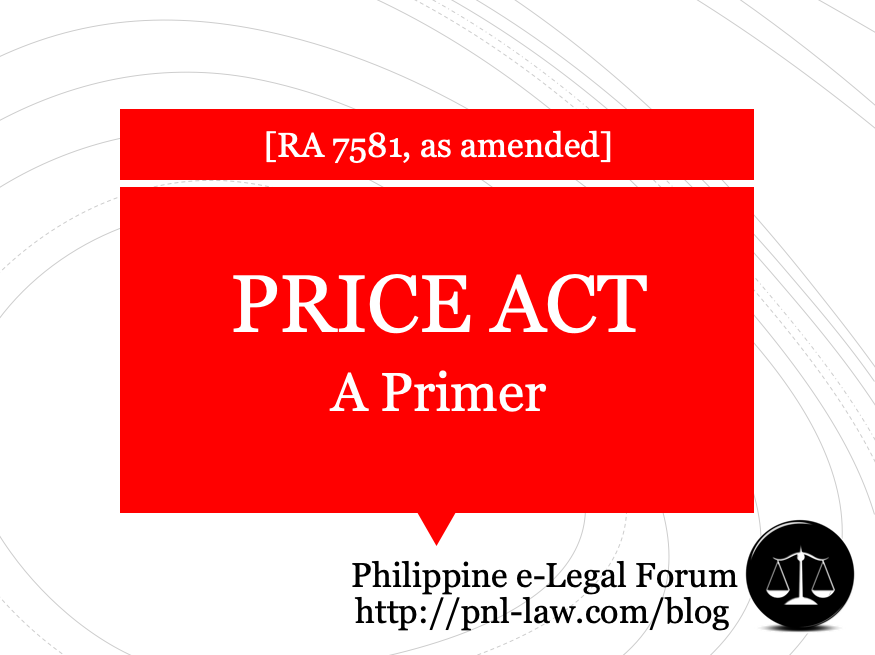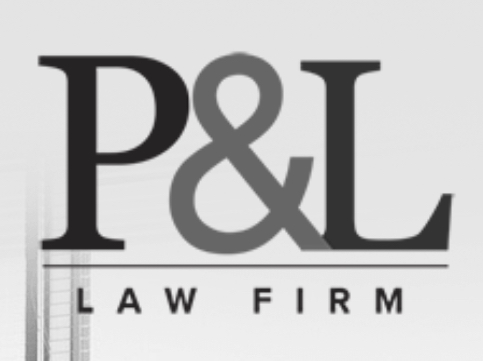


The Price Act (Republic Act No. 7581, as amended by R.A. 10623) fleshes out the policy of the Philippines to ensure the availability of basic necessities and prime commodities at reasonable prices at all times without denying legitimate business a fair return on investment, as well as the policy to provide effective and sufficient protection to consumers against hoarding, profiteering and cartels with respect to the supply, distribution, marketing and pricing of said goods, especially during periods of calamity, emergency, widespread illegal price manipulation and other similar situations.

These are goods vital to the needs of consumers for their sustenance and existence in times of any of the cases which triggers Automatic Price Control or requires the imposition of Mandated Price Ceiling. These commodities include, but not limited to:
These are goods not considered as basic necessities but are essential to consumers in times of any of the cases which triggers Automatic Price Control or requires the imposition of Mandated Price Ceiling. These commodities include, but not limited to:
The implementing agency may, after a public hearing and with the approval of the President, include or exclude any type and brand in the coverage of “basic necessities” or “prime commodities.”. Even if a type or brand of commodity has been excluded, the implementing agency may reinstate it during occasions of acute shortage in the supply of the basic necessity or prime commodity to which the excluded type or brand used to belong.
A buffer fund is a contingent fund in the budget of the implementing agency which shall not be used in its normal or regular operations but only for purposes of the Price Act. The implementing agency may procure, purchase, import, or stockpile any basic necessity or prime commodity, devise ways and means of distributing them for sale at reasonable prices in areas where there is shortage of supply or a need to effect changes in its prevailing price.
It is the abnormal phenomenon where consumers buy basic necessities and prime commodities grossly in excess of their normal requirement resulting in undue shortages of such goods to the prejudice of less privileged consumers.
It means the average price at which any basic necessity has been sold in a given time within a month from the occurrence of any of the conditions which trigger the Automatic Price Control or require the imposition of Mandated Price Ceiling.
Unless otherwise declared by the President, prices of basic necessities in an area shall automatically be frozen at their prevailing prices or placed under automatic price control in ANY of the following circumstances:
If the prevailing price of any basic necessity is excessive or unreasonable, the implementing agency may recommend to the President the imposition of a price ceiling for the sale of the basic necessity at a price other than its prevailing price.
Unless sooner lifted by the President, price control shall remain effective for the duration of the condition that brought it about, but not for more than 60 days. in the case of basic necessities that are wholly imported and deregulated under existing laws such as, but not limited to, household LPG and kerosene, price control thereon shall remain effective for a period of not more than 15 days, taking into consideration the current inventory or supply levels thereof.
It means the maximum price at which any basic necessity or prime commodity may be sold to the general public.
The President, upon the recommendation of the implementing agency or the Price Coordinating Council, may impose a price ceiling on any basic necessity or prime commodity if ANY of the following conditions so warrants:
In determining the reasonable price ceiling, the following factors may be taken into consideration:
Yes. Any person who violates the Automatic Price Control or Mandated Price Ceiling may be imprisoned for a period of not less than 1 year nor more than 10 years, or a fine of note less than P5,000 nor P1,000,000, or both, at the discretion of the court.
Yes. It is unlawful for any person habitually engaged in the production, manufacture, importation, storage, transport, distribution, sale or other methods of disposition of goods to engage in acts of price manipulation — specifically, hoarding, profiteering, or cartel.
Hoarding is the undue accumulation by a person or combination of persons of any basic commodity beyond his or their normal inventory levels or the unreasonable limitation or refusal to dispose of, sell or distribute the stocks of any basic necessity of prime commodity to the general public or the unjustified taking out of any basic necessity or prime commodity from the channels of reproduction, trade, commerce and industry.
There shall be prima facie evidence of hoarding when a person has stocks of any basic necessity or prime commodity 50% higher than his usual inventory and unreasonably limits, refuses or fails to sell the same to the general public at the time of discovery of the excess. The determination of a person’s usual inventory shall be reckoned from the third month immediately preceding before the discovery of the stocks in case the person has been engaged in the business for at least 3 months; otherwise, it shall be reckoned from the time he started his business.
Profiteering is the sale or offering for sale of any basic necessity or prime commodity at a price grossly in excess of its true worth. There shall be prima facie evidence of profiteering whenever a basic necessity or prime commodity being sold:
In the case of agricultural crops, fresh fish, fresh marine products, and other seasonal products covered by the Price Act and as determined by the implementing agency, the prima facie provisions shall not apply.
Cartel is any combination of or agreement between 2 or more persons engaged in the production, manufacture, processing, storage, supply, distribution, marketing, sale or disposition of any basic necessity or prime commodity designed to artificially and unreasonably increase or manipulate its price.
There is a prima facie evidence of engaging in a cartel whenever 2 or more persons or business enterprises competing for the same market and dealing in the same basic necessity or prime commodity, perform uniform or complementary acts among themselves which tend to bring about artificial and unreasonable increase in the price of any basic necessity or prime commodity or when they simultaneously and unreasonably increase prices on their competing products thereby lessening competition among themselves.
Violations carry a penalty of imprisonment for a period of not less than 5 years nor more than 15 years, AND a fine of not less than P5,000 nor more than P2,000,000.

Pamaos & Labao Law Firm (P&L Law) is a full-service professional legal firm, located in Metro Manila, Philippines | Telephone: (+632) 7799-0589 | Email: info@pnl-law.com | Website: http://pnl-law.com
